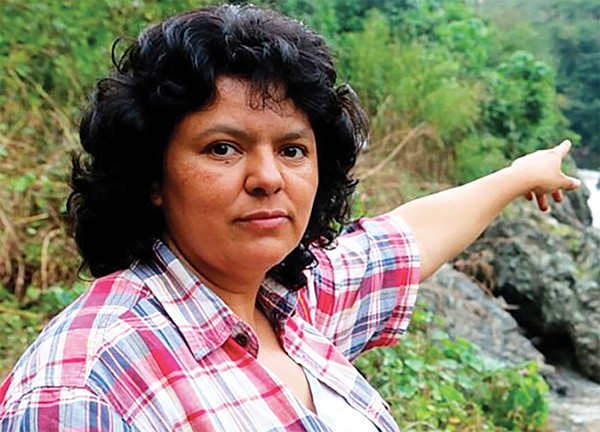International Women’s Day was March 8th. National Women’s History Month started on March 1st and ends on March 31st. As this month comes to an end, I can’t help but feel that March needs to extend for a few more days, maybe weeks.
The days of the month don’t necessarily have to change (Just think about whoever would have the job of rearranging the rhyme “30 days has September.”), but what if we could live each day as if it were International Women’s Day, or each month as if it were National Women’s History month.
 BertaCaceres.org
BertaCaceres.org
Honduran activist Berta Caceres
I don’t mean the type of celebration that, for example, ICE did on its Instagram page. That was a whole performative mess. The image posted on March 15th that read “ICE celebrates Women’s History Month, Strength through Diversity” left me with so many questions. Who is this intern that manages their social media? Are they a mastermind who has curated their Instagram page to make the irony and contradictions in ICE propaganda incredibly easy to find? Or do they really believe this stuff?
Either way, we better not be running things that way. We’re not going to be like those Democrats who tweet and post about listening to black women one day and then attack Ilhan Omar, a black Muslim woman, the next. When black women bring attention to the connections between black, brown, and indigenous struggles, as Omar has in addressing genocide in Central America and the role of the U.S., they are frightened. They are frightened by what black women have to say when they finally hold the mic.
Indigenous leader and environmental activist Berta Cáceres is known for her expression, “They fear us because we are fearless.” Cáceres was a Lenca indigenous woman born in La Esperanza, Honduras. She was dedicated to the protection of indigenous life and land. She led indigenous movements to defend natural resources that were threatened by the illegal projects of multinational companies exploiting natural resources and breaking international law. On March 2, 2016, Cáceres was assassinated in her home. Cáceres knew she was being targeted for being an outspoken advocate for human rights, as many environmental activists are. “They follow me. They threaten to kill me, to kidnap me, they threaten my family. That is what we face,” she stated.
Two years and 12 days after Cáceres’ assassination in 2016, Rio de Janeiro councilwoman, Marielle Franco was shot in her car on March 14, 2018. Franco was a queer Afro-Brazilian politician and human-rights activist. She was a favela resident, mother, and defender of human rights. Like Cáceres, Franco spoke out against injustice. She was known for addressing police brutality, economic inequity, and reproductive rights. In her campaign for city council woman, her motto was “I am because we are.” Growing up in the favelas, under-resourced, highly dense neighborhoods in the periphery of the city, she was a symbol of the resilience of Afro-Brazilians in creating community following the abolition of slavery.
Lia De Mattos Rocha, a friend of Franco, wrote about Franco’s life in a piece originally written in Portuguese and later translated into Spanish, then English. She noted how Franco marked a change from the traditional ways of Brazilian politics. “The change that we wanted to see in our institution,” she writes, “was embodied by her. Marielle was different from them, but she was like one of us: She came from struggles, social movements, black university collectives, Carnival groups, funk artist culture.”
Marielle Franco and Berta Cáceres were black, indigenous women who confronted structures that did not see them, or people like them, as human. They charged forward with dignity and marched fearlessly, knowing that black women and indigenous women like them have historically been targets of corporations and the state. Women like Franco and Cáceres continue to be targeted. They are familiar with this threat, and they carry that weight every day.
It is difficult for me to speak about them in the past tense, because in my heart, I feel them and their energy, commitment, and passion as alive. I see them in many black and brown women I know today. While these women are not in Honduras and Brazil, there are thousands of black, brown, and indigenous women there at this moment who very much embody Franco and Cáceres. But the women I know are in the U.S. South, the Mid-South, the deep South. They are often not seen; their work may not be shown in highlights of the evening news; but their communities see them. We see them protecting black and brown people, families, and communities, fighting for our dignity and our future. We see their pain and exhaustion. And in the bright moments of coming together, we see them shine.
I speak the names of Berta and Marielle into the days beyond International Women’s Day and National Women’s History Month. Their stories go beyond these few words, as do the stories of black, brown, and indigenous women around us. All we have to do is listen — really listen — and follow their lead.
Aylen Mercado is a brown, queer, Latinx chingona and Memphian pursuing an Urban Studies and Latin American and Latinx Studies degree at Rhodes College.